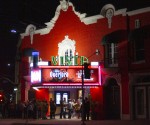Los Angeles’ blend of midnight movies, cult screenings and historic theaters offers late-night scares and childhood nostalgia back in the theater. Join columnist Nina Young as she attends different cult screenings each week to find out why audiences stay out so late after dark.
A lone tumbleweed could’ve drifted down Sunset Boulevard on Friday night outside the Vista Theatre, and I wouldn’t have been surprised.
At a midnight screening of “The Big Lebowski” in Los Feliz, the quiet urban neighborhood mirrored the film’s dreamy opening scene, where a tumbleweed rolls through an abandoned Los Angeles. But inside the cinema, at the event hosted by Nerds Like Us, lovers of the Coen brothers’ comedy celebrated the film’s 20th anniversary together, cheering while the rest of Los Angeles slept.
“The Big Lebowski” follows the tribulations of Jeff Lebowski, a middle-aged man who goes by “The Dude” – or as he jokingly says in the film, “His Dudeness” or “El Duderino.” Played by Jeff Bridges, The Dude enjoys bowling and smoking marijuana until he is mistaken for a wealthy man of the same name. The mistake eventually drags him into a mysterious conspiracy that includes German nihilists, a pornography director and a severed pinky toe.
If the film sounds too wacky for you, don’t worry – general audiences thought the same upon its 1998 release, as the movie underperformed at the box office. But in the past 20 years, “The Big Lebowski” has taken on a massive cult following due to its outrageous characters, absurd dialogue and complex storytelling.
I was unaware of the hilarious film’s cult status when my mother introduced me to the movie years ago, and it was thanks to her I recognized the quotes spouted by The Vista attendees waiting in line, most notably the phrase: “The Dude abides.” But at that moment, I was less concerned with the expression’s meaning and more interested in admiring the theater. Built in 1923, The Vista’s design mixes a Spanish-style exterior and a vintage Egyptian-style interior – a kitschy aesthetic to match the eccentric Los Angeles setting within “The Big Lebowski.”
When Bridges’ The Dude character first sauntered across the screen and used a check to pay for a 69 cent carton of milk, our small crowd cheered for the laid-back protagonist. I later learned their love for the passive philosophy of The Dude extends to a much wider audience, as the film has spawned an entire religion called “Dudeism” since its release. The religion combines ideas from Taoism and Buddhism with lines from the film, positioning The Dude as an exemplary figurehead. Followers even observe holidays such as “The Day of the Dude” on March 6, and the aforementioned phrase – “The Dude abides” – acts as a mantra, suggesting followers just “Take it easy, man.”
Bernie Bregman, founder and an event producer of Nerds Like Us, said “The Big Lebowski’s” cult following was a good backdrop for a midnight screening, as the organization’s events aim to bring fan communities together.
“You may tout something like ‘(The) Rocky Horror (Picture Show)’ as the ‘queen of cult film’ … but who (else) has a religion that came from their movie?” Bregman said.
Unfortunately, I didn’t speak to any of The Vista attendees who self-identified as Dudeists. But I did experience the crowd’s laughter in response to the film’s visual gags and surreal scenes, such as a sequence where The Dude dances within a psychedelic bowling alley. “The Big Lebowski’s” comedic tone seemed ubiquitously appreciated by the audience, although the shared laughter was somewhat misleading about the true impacts of the film.
Unofficial cult movie screening rule No. 10: Don’t expect all attendees to have even remotely similar connections to the film.
Some offbeat cult movies are difficult to categorize due to their specific tones or merged genres. “The Big Lebowski” itself defies simple classification, as it blends offbeat humor with philosophical concepts and a film noir narrative. Fans of the film can pick and choose which elements resonate most with them – it was only through speaking to attendees that I began to unravel specific reasons for its cult following.
For Bregman, “The Big Lebowski’s” significance originates in its innovative visuals and social significance, he said. The Coen brothers broke molds back in 1998 by depicting The Dude’s stoner lifestyle without judgment, Bregman said, and to celebrate that, Nerds Like Us partnered with the GREENWOLF LA marijuana dispensary to give out coupons at the midnight screening.
“Socially, (‘The Big Lebowski’) elevated the stoner film in the sense that it wasn’t a bunch of teenage screw-ups avoiding school and responsibility,” Bregman said. “It’s more about a higher level of thought: The Dude is a philosopher if nothing else. I think that gives you a different perspective and I think that it destigmatized some of that lifestyle.”
“The Big Lebowski” seemed to hold a more personal meaning for attendee Troy Martin. In a sentimental gesture, Martin said he brought to the screening the ashes of his friend who had passed away four years ago. By carrying the ashes in a container resembling a Folgers coffee tin – which directly references a famous scene in the movie – Martin said he was honoring his passed friend’s love of The Vista, cult screenings and “The Big Lebowski” all at once.
For attendee Jonathon Martellora, “The Big Lebowski” is a cult classic due to its enduring jokes and the relatable nature of The Dude, he said. Martellora even considered attending the screening in a bathrobe to mimic The Dude’s look, he said. Watching the film in a nostalgic theater, among friends and fellow fans, Martellora said he appreciated “The Big Lebowski’s” cult following even more.
“I think everybody has a little (bit of) The Dude in them,” Martellora said.
